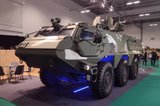Croatia orders additional remote weapon stations for armoured vehicles
The Croatian Army operates 126 Patria BOV armoured vehicles. (Photo: Duro Dakovic)
Elbit Systems Land and C4l is to supply more UT30 MK2 remote weapon stations (RWSs) with a Spike-LR ATGM capability to Croatia for installation on Patria AMV 8x8 vehicles (designated BOV in Croatian service).
The deal is worth HRK12 million ($1.8 million), according to a notice posted on the official EU contracts database on 3 January by the Croatian MoD.
However, the MoD did not disclose the delivery timeframe for the UT30 MK2 systems.
Besides the long-range ATGM, armament on the UT30MK2 for Croatia includes the MK44-ABM variant of the 30mm Bushmaster chain gun plus a 7.62mm coaxial machine gun.
According to Shephard Defence Insight, there are 126 Patria BOVs in the Croatian Army inventory with an expected out-of-service date of 2028.
In 2017, it was announced that Croatia had awarded Elbit a contract worth $14.9 million to supply the UT30 MK2 with Spike-LR missiles for its fleet of Patria AMV 8x8s originally delivered between 2008 and 2012.
It was unclear at the time whether this order was sufficient to equip the entire Croatian AMV fleet with an ATGM-capable RWS.
Related Equipment in Defence Insight
More from Land Warfare
-
![US DoD task force’s DroneHunter acquisition lays groundwork for Replicator 2 CUAS strategy]()
US DoD task force’s DroneHunter acquisition lays groundwork for Replicator 2 CUAS strategy
As the US Department of Defense looks to counter the growing threat of uncrewed aerial systems to improve homeland security, the DroneHunter acquisition could point to future commercial innovation.
-
![Norway opts for Hanwha’s Chunmoo for long-range fires under $2 billion deal]()
Norway opts for Hanwha’s Chunmoo for long-range fires under $2 billion deal
The selection of Hanwha’s K239 Chunmoo long-range precision fires system, with a contract expected to be signed on 30 January, makes Norway the second European country to choose the system. It is expected an operational system will be in service within four years.
-
![Layered protection: How air defence is adapting to rising drone and missile threats (podcast)]()
Layered protection: How air defence is adapting to rising drone and missile threats (podcast)
A surge in aerial threats – from advanced missiles to low-cost drones – is reshaping the way militaries approach air defence, driving demand for flexible, multi-layered solutions.























